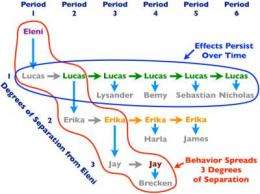'Pay it forward' pays off

For all those dismayed by scenes of looting in disaster-struck zones, whether Haiti or Chile or elsewhere, take heart: Good acts - acts of kindness, generosity and cooperation - spread just as easily as bad. And it takes only a handful of individuals to really make a difference.
In a study published in the March 8 early online edition of the Proceedings of the National Academy of Sciences, researchers from the University of California, San Diego and Harvard provide the first laboratory evidence that cooperative behavior is contagious and that it spreads from person to person to person. When people benefit from kindness they "pay it forward" by helping others who were not originally involved, and this creates a cascade of cooperation that influences dozens more in a social network.
The research was conducted by James Fowler, associate professor at UC San Diego in the Department of Political Science and Calit2's Center for Wireless and Population Health Systems, and Nicholas Christakis of Harvard, who is professor of sociology in the Faculty of Arts and Sciences and professor of medicine and medical sociology at Harvard Medical School. Fowler and Christakis are coauthors of the recently published book "Connected: The Surprising Power of Our Social Networks and How They Shape Our Lives."
In the current study, Fowler and Christakis show that when one person gives money to help others in a "public-goods game," where people have the opportunity to cooperate with each other, the recipients are more likely to give their own money away to other people in future games. This creates a domino effect in which one person's generosity spreads first to three people and then to the nine people that those three people interact with in the future, and then to still other individuals in subsequent waves of the experiment.
The effect persists, Fowler said: "You don't go back to being your 'old selfish self.''' As a result, the money a person gives in the first round of the experiment is ultimately tripled by others who are subsequently (directly or indirectly) influenced to give more. "The network functions like a matching grant," Christakis said.
"Though the multiplier in the real world may be higher or lower than what we've found in the lab," Fowler said, "personally it's very exciting to learn that kindness spreads to people I don't know or have never met. We have direct experience of giving and seeing people's immediate reactions, but we don't typically see how our generosity cascades through the social network to affect the lives of dozens or maybe hundreds of other people."
The study participants were strangers to each other and never played twice with the same person, a study design that eliminates direct reciprocity and reputation management as possible causes.
In previous work demonstrating the contagious spread of behaviors, emotions and ideas - including obesity, happiness, smoking cessation and loneliness - Fowler and Christakis examined social networks re-created from the records of the Framingham Heart Study. But like all observational studies, those findings could also have partially reflected the fact that people were choosing to interact with people like themselves or that people were exposed to the same environment. The experimental method used here eliminates such factors.
The study is the first work to document experimentally Fowler and Christakis's earlier findings that social contagion travels in networks up to three degrees of separation, and the first to corroborate evidence from others' observational studies on the spread of cooperation.
The contagious effect in the study was symmetric; uncooperative behavior also spread, but there was nothing to suggest that it spread any more or any less robustly than cooperative behavior, Fowler said.
From a scientific perspective, Fowler added, these findings suggest the fascinating possibility that the process of contagion may have contributed to the evolution of cooperation: Groups with altruists in them will be more altruistic as a whole and more likely to survive than selfish groups.
"Our work over the past few years, examining the function of human social networks and their genetic origins, has led us to conclude that there is a deep and fundamental connection between social networks and goodness," said Christakis. "The flow of good and desirable properties like ideas, love and kindness is required for human social networks to endure, and, in turn, networks are required for such properties to spread. Humans form social networks because the benefits of a connected life outweigh the costs."
Provided by University of California - San Diego















